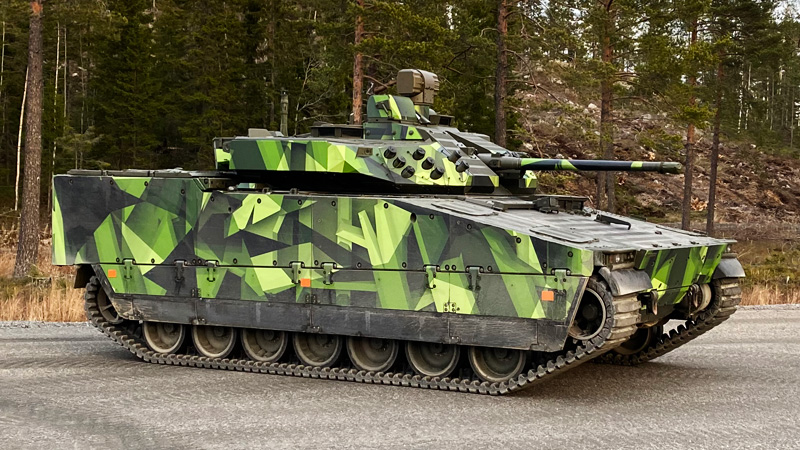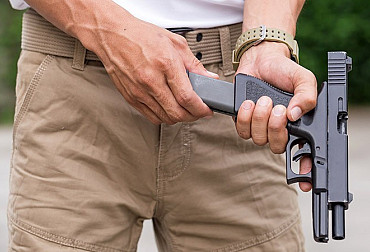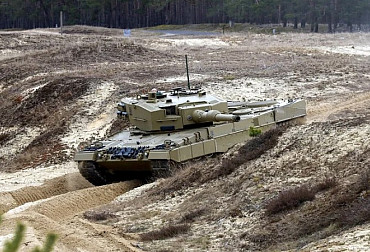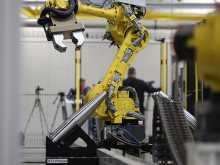Defence Committee discusses tanks, IFVs, drones and competences
The 29th meeting of the Defence Committee was a follow-up to the previous extraordinary meeting, which was attended only by opposition MPs. This meeting included two adjourned agenda items, namely clarification of the position of the Chief of the General Staff of the Armed Forces in the management of the Armed Forces on the basis of media information and information from the Ministry of Defence on the purchase of CV90 IFVs. This meeting was held with the standard line-up, including Defence Minister Jana Černochová and the Chief of the General Staff of the Czech Armed Forces, Lieutenant General Karel Řehka.
 Picture: The 29th meeting of the Defence Committee was devoted, among other things, to clarifying the position of the Chief of the General Staff of the Czech Armed Forces in the management of the Czech Armed Forces on the basis of media information and the Ministry of Defence's information on the purchase of CV90 biplanes | Jan Zilvar / CZ DEFENCE
Picture: The 29th meeting of the Defence Committee was devoted, among other things, to clarifying the position of the Chief of the General Staff of the Czech Armed Forces in the management of the Czech Armed Forces on the basis of media information and the Ministry of Defence's information on the purchase of CV90 biplanes | Jan Zilvar / CZ DEFENCE
The opening of the meeting was marked by clarification of the position of the Chief of the General Staff of the Army of the Czech Republic in the management of the Army of the Czech Republic. According to information that appeared in the media, Gen. Řehka was even to propose his resignation to Prime Minister Petr Fiala because of disagreements with the minister. In her statement, Minister Jana Černochová referred to the competences of the Minister of Defence, which are contained in particular in Act 2/1969 Coll. (the Competence Act), Act 219/1999 Coll. (the Act on the Armed Forces of the Czech Republic), Act 221/1999 Coll. At the end of her speech, the Minister said, "Your point is called clarification of the position of the Chief of the General Staff in the management of the Army of the Czech Republic on the basis of media information, and I am therefore very glad that I could explain this to you all today," said the Minister, who added that there was no problem in communicating with the Chief of the General Staff and gave the example of the joint opening of the Our Security is Not a Given conference at Prague Castle in the morning. General Řehka subsequently stated in his reaction that he had never had any conflict or clash with the Defence Minister or anyone else in the Defence Ministry on essential strategic matters, the direction of the ministries, defence policy, defence military strategy, the direction of the armed forces, etc. Any disputes with the Minister, he said, stem from normal work activities, especially in today's difficult situation, and he resolves them with the Minister of Defence as part of his normal work agenda. "I think that is the way it should be dealt with and I am not going to address it elsewhere and I am not going to comment on it anywhere. And I don't think it's a matter of parliamentary scrutiny," the Chief of General Staff added.
The discussion on the purchase of the CV90 IFVs was similarly emotional. Minister Černochová reminded the committee members that the contract for the acquisition of tracked IFVs was discussed as confidential material and was made available to MPs at the time of the government's deliberations. The Defence Committee was briefed on the progress of the contract at the 25th meeting of the Committee on 11 April 2023. More detailed information on the contract was reportedly received by the Chair of the Defence Committee as early as 24 May 2023 in writing as an annex to a classified document and, according to the Minister, Members were therefore able to see the document. "We have managed to negotiate the largest ever army contract for the purchase of equipment for which the soldiers have been calling for many years and whose replacement was already desperately needed," the minister pointed out, adding that the acquisition of infantry fighting vehicles is one of the key objectives set by NATO for the Czech Republic under the so-called NATO Capability Development Goals and the acquisition of infantry fighting vehicles is essential for the construction of the heavy brigade task force. "In addition to substantially strengthening the defence of the Czech Republic, the acquisition of this equipment will also fulfil our commitments to NATO," the Minister added. Based on the recently signed contract, the Ministry of Defence plans to acquire 246 infantry fighting vehicles in seven modifications and 29 wheeled workshop vehicles in three modifications with additional accessories such as training, simulators, camouflage kits or spare parts.
 Picture: The Ministry of Defence plans to purchase 246 CV90 infantry fighting vehicles in seven modifications based on the recently signed contract | Michal Pivoňka / CZ DEFENCE
Picture: The Ministry of Defence plans to purchase 246 CV90 infantry fighting vehicles in seven modifications based on the recently signed contract | Michal Pivoňka / CZ DEFENCE
Initially, 210 combat vehicles were to be procured, and an additional 36 were to have options in the contract for possible future acquisition. However, the minister said that favourable terms for the purchase were reached, so in agreement with the army, the ministry eventually decided to exercise the option outright and inquire for all 246 combat vehicles at once. Another important parameter of the contract was the industrial cooperation of Czech arms companies, or its declared level of 40% of the contract price. The Minister of Defence informed the MPs about a joint meeting at the Ministry of Defence with the participation of BAE Systems Hägglunds and five Czech strategic partners for industrial cooperation, i.e. Excalibur Army, Meopta, Ray Service, VOP CZ and VR Group. According to the Minister, the Swedish side expects that the involvement of Czech companies in the contract will even significantly exceed the guaranteed 40%. After the meeting, a representative of BAE Systems said that at the moment their orders from Czech industry amounted to CZK 5.1 billion and that contracts with other subcontractors should be concluded in the autumn in order to fulfil the contractual commitment. "We have embarked on a common path and I believe that now everything will be successful and it will be a profitable, long-term cooperation for 30 to 40 years," commented Tommy Gustafsson-Rask, President of BAE Systems-Hägglunds, Sweden. The Minister added that two of the five companies are already involved in Slovakia. "Once again, within the framework of industrial cooperation, we are negotiating for our Czech industry to be involved not only in the Czech Republic, but also in other countries that are acquiring the same infantry fighting vehicles as Slovakia is now," the minister said, adding that this area also includes the signing of a memorandum with Ukraine, which is also interested in these IFVs. "I would like to thank the Minister of Defence and, in fact, the whole team, because this is an extremely important delivery for the army and its modernisation. Firstly, as an alliance contribution, but also for the combat capability of the army as such," said General Řehka. "I want to assure that the army is doing everything possible to successfully put these vehicles into service in the shortest possible time, while complying with all the rules. We are waiting for them," the Chief of the General Staff added. The MPs, among other things, dwelt on the inflation clause that is part of the contract. The Chief Director of the Armaments and Acquisitions Section, Lubor Koudelka, explained that this is a perfectly normal part of long-standing contracts. "Especially in the current situation, because if we were to ask the Swedish side for a fixed price, they would include the current extremely high inflation for each year. And the inflation clause is designed in such a way that it will basically be audited and the input prices will of course be included there," Koudelka said.
The Defence Committee then went on to consider information from the Ministry of Defence on the cost of commissioning the donated Leopard 2 A4 tanks. On this point, Minister Černochová said that currently, on the basis of the contract of 11 October 2022 between the Ministries of Defence of the Czech Republic, the Federal Republic of Germany and Rheinmetall, 14 Leopard 2 A4 tanks, one recovery tank and related material and services are being delivered, worth approximately CZK 3.7 billion excluding VAT.
 Picture: The Leopard 2 A4 tanks will primarily be used to train soldiers of the 73rd Tank Battalion, including active reserves. They will ensure a smooth transition to the new type of main battle tank and its implementation into use in the Czech Armed Forces. | Michal Pivoňka / CZ DEFENCE
Picture: The Leopard 2 A4 tanks will primarily be used to train soldiers of the 73rd Tank Battalion, including active reserves. They will ensure a smooth transition to the new type of main battle tank and its implementation into use in the Czech Armed Forces. | Michal Pivoňka / CZ DEFENCE
The delivery does not include communication and information systems. The new radios will also require modification of the vehicles' electrical network and, in accordance with the requirements of the Czech Army, a fire protection system must also be installed in the vehicles. "Currently, the total cost of putting the tanks into service is estimated at approximately CZK 530 million excluding VAT," the minister said. Deputy Chief of the General Staff, Lieutenant General Miroslav Hlaváč added that the delivery includes, among other things, a set of spare parts, special tools and equipment and service support for three years. The delivery also includes an initial package of 120 millimetre ammunition in the number of 1 623 pieces of anti-tank sub-calibre ammunition and 616 pieces of triple burst ammunition. New thermal imaging equipment is also included. What needs to be acquired is training ammunition for tank crew training. General Hlaváč confirmed that the cost of commissioning the donated Leopard tanks is approximately CZK 130 million excluding VAT and CZK 400 million excluding VAT will be spent on the acquisition of training ammunition. The army will receive all 14 machines by the end of this year. Chief Director Lubor Koudelka then informed about the ongoing technical evaluation of 33 T-72M4 CZ tanks. These tanks will not be shipped to Ukraine, they will remain in the armament of the AFU and will be replaced only by a new type of acquired tank.
The committee's next agenda, concerning information from the Ministry of Defence on the acquisition of unmanned aerial vehicles and interim information on the situation in Ukraine, was then held in closed session. Members of the Defence Committee are not expected to meet again until the end of August.
In addition to the modernisation process, there is an increasing emphasis on staffing, the ability to recruit new soldiers and active reserves. The concept of building the Czech Army envisages thirty thousand professional soldiers and ten thousand reservists in 2030. That is why, also in view of the current recruitment development, we asked the MPs about the following: In your opinion, is it a realistic plan to replenish the Czech Armed Forces to the level of 30,000 professional soldiers and 10,000 soldiers in active reserve in 2030?
 Picture: We asked the members of the defence committee whether they think the plan to replenish the Czech Armed Forces to the level of 30,000 professional soldiers and 10,000 soldiers in active reserve in 2030 is realistic. | Ministry of Defence of the Czech Republic
Picture: We asked the members of the defence committee whether they think the plan to replenish the Czech Armed Forces to the level of 30,000 professional soldiers and 10,000 soldiers in active reserve in 2030 is realistic. | Ministry of Defence of the Czech Republic
Lubomír Metnar (ANO), Chairman of the Committee
Last year, the Ministry of Defence announced that, due to the outbreak of war in Ukraine, there was an increased interest in serving in the army. The Minister also presented a plan to streamline recruitment, but the figures speak for themselves. The increase in the number of conscripted soldiers in 2022 is minimal and even below average compared to 2018-2021. Unless the Ministry of Defence actually starts taking steps to make recruitment more attractive and efficient, it will be impossible to come close to this figure.
Josef Flek (STAN), Vice-Chairman of the Committee
We simply have to achieve this goal, because otherwise we will not have a sufficiently functional national defence. We can no longer afford to be lulled into thinking that someone else will deal with defence for us. We must deal with it here and now. We must, of course, improve conditions for soldiers and for AR, replenish equipment, improve recruitment, and ensure the army's reputation. Modern equipment is important, but without a live force it will be useless. Artificial intelligence will not solve everything, although I think we must gradually integrate it into combat. Other countries will do so. But in 2030, we will still need live human beings in both the military and the active reserves, so those numbers are still a priority. The guiding principle must be technology that protects the troops. It just all goes hand in hand. We can't neglect anything else.
Jan Hofmann (ODS), Vice-Chairman of the Committee
I believe that we will. The changes that have recently taken place in the recruitment system are, in my opinion, moving in the right direction. The growing prestige of the profession and the quality of the equipment will certainly have an impact on interest.
Stanislav Blaha (ODS), Member of the Committee
I think it is achievable. The Czech Army has succeeded in increasing the number of active soldiers in recent years. The security situation in Europe and the war in Ukraine, which have led to increased interest in military service, have certainly played a part in this. But it is also helped by the long-term position of our Army as a reliable and modern employer. As of this year, approximately 28,000 career soldiers are serving in the Army, an increase of around 3,000 compared to 2019, when the target of 30,000 by 2030 was set. That's a good indication that the Army is on track to meet its recruitment plan. Recruiting is more difficult for the active reserves. The level of interest from people in the coming years is hard to estimate, but I believe the target will be met within seven years. The number of reservists is based on people who often have demanding jobs, both time-consuming and physically demanding. Those who serve in the active reserves are highly motivated and can combine these two lives. On the other hand, however, the Ministry of Defence is succeeding in adopting changes that generally make service in the active reserves easier for both applicants and employers. I think this will have a positive effect on recruitment in the years to come. I also see the possibility of targeting retired professional soldiers who still have a passion for serving in the army as appropriate.
Jiří Horák (KDU-ČSL), Member of the Committee
First of all, I would like to say that security is one of the main priorities of this Government and that this is directly reflected in the resources that the Ministry of Defence has and will have at its disposal. The security of our country is closely linked to the number of our professional soldiers. While in 2015 the Czech Republic had a total of 21 500 professional soldiers, last year there were already 26 500. From this perspective, I see no reason why the upward trend should not continue in the coming years. However, in order to have at least 30 000 soldiers at the end of the decade, we need to create conditions that will attract and motivate young and capable people to become professional soldiers. These include, in particular, pay, logistical facilities, equipping the army with modern military equipment and the appropriate equipment and gear for the soldiers themselves. The basic prerequisite is to have sufficient funds to ensure these conditions. By adopting a law anchoring defence spending at 2% of GDP, we are in the best position to achieve this objective. With regard to the active reserves, the Czech Republic currently has about 4 000 members, with a significant increase in the last year due to the war in Ukraine. Having 10 000 of them by 2030 is an ambitious plan and, as with professional soldiers, potential recruits will need to be significantly motivated.
Karel Krejza (ODS), Member of the Committee
It is realistic and it is all the more realistic the more tensions escalate. We must set ourselves targets. Security is not free.
Petr Liška (STAN), Member of the Committee
Of course, I perceive that there is a lot of competition on the labour market for the employment of professional soldiers in particular. Here I see a way forward in incentives for potential candidates for a career as a soldier. In my opinion, the increased costs of the Czech Army cannot be directed only at weapons, buildings and technology, but also, in proportion, at people, where there is room, for example, for creating favourable conditions for the lives of soldiers and their families. There are a number of areas where the profession can be made more attractive and the risks that soldiers undertake in their profession can be balanced. So I believe that the commitment to the number of soldiers, with some personnel measures or benefits, can be met within a given time. In the Active Reserves, it may be about making the AR more popular, their contribution to the defence of the country, motivating employers, etc. The current security situation in Europe also helps. However, I personally also see potential, e.g. in the possibilities of linking preparatory and training programmes in other ministries with the potential of their use in the defence sector. This may, of course, also require a different view of the approach to active reserves, which we could apply to some specialised professions and fields of activity in the civilian sector. Here too, therefore, there is potential for the planned numbers to be met.
Michaela Opltová (STAN), Member of the Committee
The current trend in recent years shows that the plan is definitely not unrealistic. However, we have to take into account several variables that may complicate the set objectives. First and foremost is the number of soldiers who will retire or go into civilian life and by whose numbers recruitment will have to exceed. Second is the shortage of people in the labor market and the country's long-standing low unemployment rate, which will certainly be reflected in the number of potential recruits. Last but not least, the prestige of the profession and the working conditions of the soldiers will play a role. There is no doubt that this is a stable and financially well-paid profession, with the prospect of professional growth and added value. However, we must look at how family-friendly such a job is, and at the availability of housing and social facilities for soldiers' families. If the state is to meet its stated objective, it must also focus on these areas, which will play a significant role in the career choices of today's adolescent generation.
Radovan Vích (SPD), Member of the Committee
This plan is very ambitious and will most likely not be achieved. Let us look at the attrition rate of the professional soldiers, the average age of those serving in the Armed Forces and the population curve. If we also look at the fact of how many professional soldiers were recruited and how many left last year, we are left with net numbers that are alarming. Unless the Ministry of Defence comes up with some significant recruitment incentives in the very near future, the situation will only continue to deteriorate and the IAF will not only be understaffed but will continue to age. The responsibility for the current situation lies with the current MoD leadership.
Lubomír Wenzl (ANO), Member of the Committee
I am convinced that the plan in terms of numbers is feasible. This is provided there are sufficient numbers of people interested in the service. However, it must not be the case that the demands on candidates in the recruitment and training process are reduced in order to meet the planned number. That would be the wrong way to go.





















